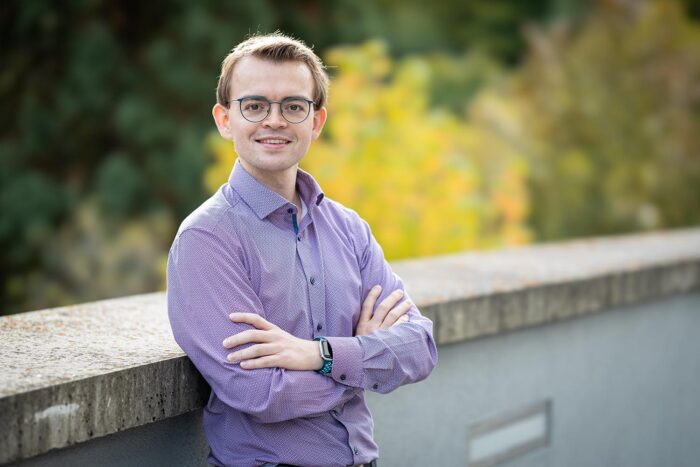
Patrick Chitwood is one of six recipients of the 2020 International Birnstiel Award for Doctoral Research in Molecular Life Sciences. Patrick was nominated for making a “fundamental discovery of broad importance and impact” with his work on membrane proteins while a PhD student in Manu Hegde’s group in the LMB’s Cell Biology Division. Another of the winners is LMB alumnus Christopher Reinkemeier who was a Masters student in Jason Chin’s group in the LMB’s PNAC Division.
The Birnstiel Award acknowledges outstanding talent and celebrates the research successes of young, up-and-coming, scientists and is awarded by the Research Institute of Molecular Pathology (IMP) in Vienna, in collaboration with the Max Birnstiel Foundation. The award is named after Max Birnstiel, a molecular biologist and founding director of the IMP whose research focused on gene regulation in eukaryotes.
Patrick’s work has focussed on improving our understanding of the assembly of membrane proteins. Membrane proteins carry out a wide variety of required functions at the surface of our cells and must be correctly oriented, folded, and assembled to do so. Patrick’s most impressive piece of work was his recent discovery of a chaperone complex that helps membrane proteins assemble correctly. This chaperone, that he named the PAT complex, binds to membrane-spanning segments of partially produced membrane proteins, protecting the interfaces between segments until a stable structure is assembled. How multi-spanning membrane proteins fold properly has been a long-standing problem, so discovery of this chaperone opens up the problem for further investigation. Most remarkably, Patrick led this project and only shared authorship with his supervisor, Manu.
Prior to his search for intramembrane chaperones, Patrick had worked on earlier steps in how a membrane protein gets made properly and discovered a factor that helps to ensure the correct orientation of the first membrane-spanning segment of G protein-coupled receptors (GPCRs).
About winning the award, Patrick commented: “It feels amazing to be recognised by the IMP for this 3.5 year obsession during my PhD at the LMB – almost as amazing as when I first saw the purified PAT complex on a gel!”

Christopher is now a PhD student in Edward Lemke’s group at EMBL in Heidelberg, Germany, and won the Birnstiel Award for his work to create membraneless organelles within cells that allow selective orthogonal protein translation, meaning that non-canonical amino acids can be used to introduce new functionalities into proteins made in that part of the cell without affecting the proteins made elsewhere in the cell.
Both Patrick and Christopher will receive a trophy, certificate and €2000, and will be given the opportunity to present their work to an international audience of biologists in a virtual format.
Further references
2020 International Birnstiel Award
Manu’s group page
Jason’s group page
Previous Insights on Research
New insight into how membrane proteins are made
Discovery of a chaperone for membrane proteins